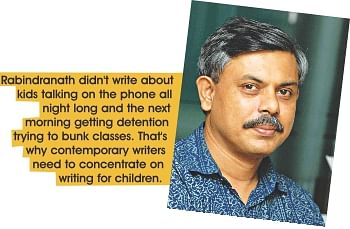Shingara with Anisul Hoque
By Moyukh
From the moment we start speaking, Anisul Hoque throws a surprise. It is common to hear - and to some extent, believe - that our generation and books are just not compatible. So when we ask why so, Anisul Hoque replies with doubt about the certainty of the fact; he for one believes that our reading habits are still very much alive.
“We have a lot more now for our entertainment - from video games to foreign movies available cheaply in the markets - and these do not require as much of our attention as does reading.” He explains that the hectic life of children now - with the studies, extra-curricular and coaching pressures - doesn't allow them the time and the patience to read. The percentage of people who read compared to the literacy rate may have dropped due to these alternate entertainment forms. But he still believes kids are reading. And while it may seem that many - having gotten a taste of international literature - are shunning Bangla books, the majority, if they read, read Bangla literature, he says.
 This inevitably leads to the topic of children's books and he tells us that though a lot of books are being published every year, from his point of view, the quality has fallen. Mr Hoque says, “Most of the important writers in Bangla literature who have written very well for adults are not writing for children. So there is a vacuum in that sector.” Talking of what I personally read as a kid, we start talking of Shahriar Kabir. “Shahriar Kabir and Dr. Mohammad Zafar Iqbal are the last two authors who wrote solely for children. Lutfur Rahman Riton and Amirul Islam used to write for children long ago, but nowadays there are no more mainstream writers writing solely for children,” Anisul Hoque says.
This inevitably leads to the topic of children's books and he tells us that though a lot of books are being published every year, from his point of view, the quality has fallen. Mr Hoque says, “Most of the important writers in Bangla literature who have written very well for adults are not writing for children. So there is a vacuum in that sector.” Talking of what I personally read as a kid, we start talking of Shahriar Kabir. “Shahriar Kabir and Dr. Mohammad Zafar Iqbal are the last two authors who wrote solely for children. Lutfur Rahman Riton and Amirul Islam used to write for children long ago, but nowadays there are no more mainstream writers writing solely for children,” Anisul Hoque says.
According to him, the best option would be to read the classics of children literature that we have. “Tenida, Ghonada, Kaka-babu, Satyajit Ray's Feluda books are still available today. Rabindranath's childrens' stories are available. But the problem is people aren't attracted towards the past. Rabindranath didn't write about kids talking on the phone all night long and the next morning with red eyes, getting detention trying to bunk classes; of the life of SMS and internet. That's why contemporary writers need to concentrate on writing for children.”
“We want more people to read. Books expand the imagination - reading Bivutibhusan's Pather Panchali, let's you imagine your own Apu, different from mine; watching Satyajit's film Apu, not much is left to the imagination.” Anisul Hoque talks about the importance of literature - he says it broadens the mind and makes one amiable as he recites, “Bash baganer mathar upor chand uththeche oi…”
I ask him about what an ideal children's story should be like - about its content and characteristics. “For the very young, it's important that they get the fun of reading from books.” It's important for children who are older that they don't feel patronised, he says. They should feel good about reading. “Zafar Iqbal sir has really good children's books; Humayun Ahmed has had really good stories for children.” But even these books, he adds, must be published with more care - without mistakes in spelling as they are now.
He considers his best children's stories “Dukkho Pori, Shukh Pori”, “Amader Class e Ekta Pori Pore” and “Kaker Naam Shabani”; these were the stories he told his daughter when she was a kid. “I wrote them down the next morning. The most important thing to remember, when writing for children, is who you are writing for. You have to tailor the story for them, not just write a story. And kids love adventure, they want to get out of their confined lives - this has been true since Mark Twain.” He tells me that keeping in mind whether you are telling the story for 10 year old or a 12 year old is important - the audience has to be always kept in mind.
“I was a weird kid. I grew up reading Kazi Nazrul Islam's and Rabindranath Tagore's poems for children. And I read fairy tales a lot. When it comes to Bangla children's literature, I personally love Shibram Chakrabarty and Sukumar Ray. From contemporary books, I would say 'Amar Bandhu Rashed' is my favourite. From Calcutta I would recommend 'Manojder Odvut Bari' by Sirshendu.” He talks of a book he enjoyed reading as a kid: 'Sumudro Onek Boro' by Akhtar Hossain, which has been out of publication for a while and how he is trying to get publishers to get it printed again.
We again go back to international literature from Bangla in the end. When asked about his favourite, he says, “Amphibian Man.”

